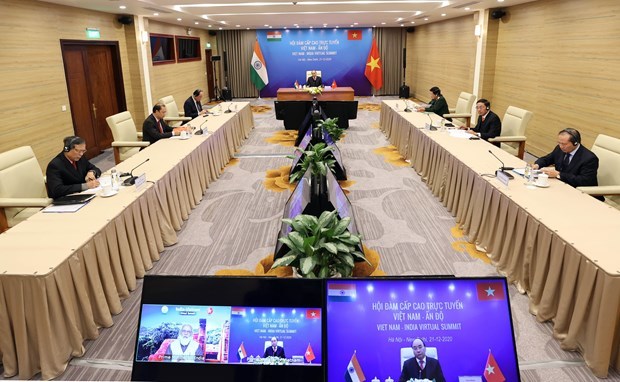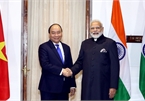 |
|
Prime Minister Nguyen Xuan Phuc and his Indian counterpart Narendra Modi co-chair the Vietnam-India Virtual Summit on December 21. (Photo: VNA)
|
At the event, PM Phuc spoke highly of the steady development of Vietnam - India relations over the past time, especially since the two countries upgraded their ties to a Comprehensive Strategic Partnership in 2016. He thanked India and Prime Minister Modi for actively contributing to the success of the 17th ASEAN - India Summit and the 15th East Asia Summit within the framework of ASEAN 2020 chaired by Vietnam.
Congratulating India on becoming a non-permanent member of the United Nations Security Council (UNSC) for the 2021-2022 term, the Vietnamese Government leader appreciated India's sharing with and support to Vietnam in overcoming consequences of storms and floods in central provinces recently.
Prime Minister Narendra Modi also congratulated Vietnam on well controlling the COVID-19 pandemic, maintaining socio-economic development, and successfully assuming the role of ASEAN 2020 Chair and a non-permanent member of the UNSC for 2020-2021.
He affirmed that Vietnam plays a leading role in the "Act East" policy of India.
The PMs asserted that this virtual summit demonstrates the determination of the two sides to overcome challenges from the pandemic to continue deepening the Vietnam-India relations on the basis of traditional friendship, cohesion in history, culture and religion, mutual understanding and trust, as well as the similar visions and interests in regional and international issues.
They highly valued the results of the 17th session of the Vietnam - India Joint Commission via a video conference in August 2020 and welcomed the two Foreign Ministers’ signing of the Plan of Action to implement the two countries’ Comprehensive Strategic Partnership for the 2021-2023 period on the occasion of the online summit.
Stressing that defence and security cooperation is a pillar in the bilateral relationship, both leaders agreed to continue promoting consultation and dialogue mechanisms to expand cooperation in defence industry and training as well as coordination in UN peacekeeping activities.
The two sides should promote cooperation in responding to traditional and non-traditional security challenges.
Regarding economic partnership, the two sides agreed to make efforts to soon achieve the target of 15 billion USD in two-way trade per year through strengthening trade promotion, minimising technical barriers, and limiting trade defence remedies and policies that are not conducive to imports and exports.
They need to enhance the connection of production chains, maintain the stability of regional and global supply chains, and expand collaboration in the fields of energy, science and technology, artificial intelligence, 5G network and start-up development.
PM Phuc thanked the Indian Government for its continued provision of non-refundable aid and preferential credit for Vietnam, actively contributing to socio-economic development in localities and the preservation of cultural heritage, thus further tightening the friendship and people-to-people exchange between the two countries.
The two sides agreed to increase mutual support and closer coordination at international and regional forums, especially at the United Nations, when the two countries are members of the UNSC in 2021, as well as at ASEAN-led mechanisms and those within the framework of the Mekong - Ganga cooperation.
The PMs affirmed the importance of maintaining peace, stability, security, safety and freedom of navigation and aviation, and peaceful settlement of disputes based on international law, especially the 1982 United Nations Convention on the Law of the Sea (UNCLOS 1982). They emphasised UNCLOS as the legal framework governing all activities at sea and ocean, and urged the parties to fully and effectively implement the Declaration on the Conduct of the Parties in the East Sea (DOC) and soon complete a practical and effective Code of Conduct in the East Sea (COC) in accordance with international law, especially UNCLOS.
At the end of the summit, the two leaders approved the "Vietnam-India declaration of common vision on peace, prosperity and the people" to orient the development of the comprehensive strategic partnership between the two countries in the years to come.
On this occasion, the ministries and agencies of the two countries also signed seven documents and announced three cooperation programmes in the fields of defence, civil nuclear, oil and gas, clean energy, health, and development cooperation, heritage conservation and cultural exchange./.
Vietnam, India set forth joint vision for peace, prosperity and people
Prime Minister Nguyen Xuan Phuc and his Indian counterpart Narenda Modi exchanged views on wide-ranging bilateral, regional and global issues and set forth the Joint Vision for Peace, Prosperity and People to guide the future development of India - Vietnam Comprehensive Strategic Partnership, during a virtual summit on December 21.
 |
|
Prime Minister Nguyen Xuan Phuc and his Indian counterpart Narendra Modi co-chair the Vietnam-India Virtual Summit on December 21.
|
The leaders reaffirmed their wish to further advance the comprehensive strategic partnership, and agreed to increase high-level delegation exchanges as well as cooperation mechanisms between the two countries.
They shared the view that the enhanced defence and security ties would be an important factor to stability in Indo-Pacific. The PMs, therefore, agreed to promote military exchanges and step up collaboration in military industry, using India’s defence packages for Vietnam.
The two sides will share information and cooperate in UN peacekeeping operations, while tightening their cooperation in security through existing dialogue mechanisms in order to cope with traditional and non-traditional maritime security threats and cyber security.
Stressing the link between security and prosperity, the leaders reiterated the significance of maintaining peace, stability, security and freedom of navigation and aviation in the East Sea, peacefully addressing disputes in line with international law, particularly the 1982 United Nations Convention on the Law of the Sea, and not using or threatening to use force.
They called for more efforts in fully and effectively realising the Declaration on the Conduct of Parties in the East Sea (DOC), and result-oriented negotiations to soon complete a Code of Conduct in the East Sea (COC) in accordance with international law, especially the UNCLOS, not affecting legal rights and interests of all countries, including those not engaging in the negotiations.
The leaders emphasised the importance of ASEAN-India cooperation to maintaining peace, security and prosperity in the region, and consented to seek new, pragmatic cooperation areas.
The two sides will also intensify multi-lateral and regional collaboration, including in the United Nations, ASEAN-led mechanisms and Mekong Sub-regional cooperation.
The two sides will step up joint efforts in building a strong consensus for early adoption of the Comprehensive Convention on International Terrorism (CCIT).
The two sides will work towards reliable, efficient and resilient supply chains, and will promote human-centric globalisation. They will strive to achieve the target of 15 billion USD of trade turnover at the earliest and will set higher levels of ambition for bilateral trade based on a concrete plan of action and new supply chains located in each other’s country.
Both sides will unceasingly upgrade bilateral economic ties through facilitating long-term investment in each other’s economy, boosting joint ventures, taking part in new global value chains, encouraging regional e-commerce and enhancing market access capacity.
The two sides will exploit the similarity in goals: India’s digital India and Vietnam’s digital society vision, as well as promote cooperation in the fields of civil nuclear and space technology, transformation technologies in IT and communications, ocean sciences, sustainable agriculture, water resources management, comprehensive health care, vaccine and pharmaceuticals, smart urban centres and start-up.
They will cooperate in new energy, renewable energy and technologies adaptive to climate change.
India will continue supporting capacity enhancement for Vietnamese localities, including the expansion of India’s Quick Impact Project (QIP) programme within the framework of Mekong-Ganga river cooperation and other programmes of the Indian Technical and Economic Cooperation (ITEC) and e-ITEC in various areas.
Emphasising the long-lasting connection in culture and history between Vietnam and India, the two sides will inherit and promote study on cultural heritage. Cooperation in cultural heritage conservation will be considered a main pillar in the two countries’ development partnership.
They will also make efforts to promote people-to-people exchange by increasing direct flights, facilitating travel with the simplification of visa procedures and tourism promotion.
The two PM expressed their belief that the joint vision will be a basis for a new era in the Vietnam – India Comprehensive Strategic Partnership. To realise the vision, the two sides will revise action programmes for each stage, starting from the 2021-23 period./.VNA

PM Phuc to hold virtual summit with Indian counterpart Modi next week
Prime Minister Nguyen Xuan Phuc and Indian Prime Minister Narendra Modi will hold virtual summit on December 21, Foreign Ministry’s Spokesperson Le Thi Thu Hang told a room of reporters Thursday.